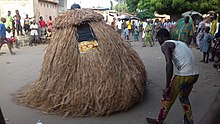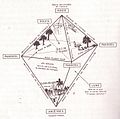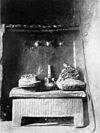Portal:Traditional African religions
Introduction The beliefs and practices of African people are highly diverse, including various ethnic religions. Generally, these traditions are oral rather than scriptural and are passed down from one generation to another through folk tales, songs, and festivals, and include beliefs in spirits and higher and lower gods, sometimes including a supreme being, as well as the veneration of the dead, and use of magic and traditional African medicine. Most religions can be described as animistic with various polytheistic and pantheistic aspects. The role of humanity is generally seen as one of harmonizing nature with the supernatural. In the past, African religion used to be referred to as 'traditional' but this is no longer appropriate. 'Traditional' was used to distinguish Africa religion from Abrahamic religion which came to the continent as a result of proselytism. Colonialism supported the false view that Africa had no religion. (Full article...) Selected articleThe Battle of Fandane-Thiouthioune also known as the Battle of Somb occurred on 18 July 1867. It was a religious war between the Serer people who adhered to the tenets of Serer religion and the Muslim Marabouts of 19th century Senegambia who came to convert them through jihad. Although religious, it also had a political and economic dimension to it: vendetta and empire-building. Fandane, Thiouthioune and Somb were part of the pre-colonial Serer Kingdom of Sine now part of independent Senegal. The Serer people defeated the Muslims and killed their leader. Selected imagesFestivalsThere are several religious festivals found in the various Traditional African religions. Some of these are listed below next to their corresponding religion :
Selected biography
The King of Oussouye is a religious, spiritual and traditional leader of the Jola people who follow their traditional religion. The Jolas believe in a god called Ata Emit. The King is an intermediary between God and men. The king is described as a "collaborator of God who receives offerings to pray and intercede with the spirits".
Selected quote
Ram Swarup quoted in Koenraad Elst (2002) Source: Swarup, Ram [in] Elst, Koenraad, Who is a Hindu? : Hindu Revivalist Views of Animism, Buddhism, Sikhism, and Other Offshoots of Hinduism, Voice of India (2002), p. 72, ISBN 9788185990743
Did you know
Related portalsTopicsFor more Traditional African religion topics, see Category:Traditional African religions.
CategoriesWikiProjectsThings you can doAssociated WikimediaThe following Wikimedia Foundation sister projects provide more on this subject:
Discover Wikipedia using portals |






































